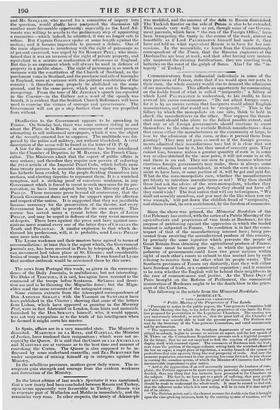Disaffection to the Government appears to be spreading in France.
On Sunday last, there was some serious rioting in and about the Place de la Bourse, in consequence of several persons attempting to sell unlicensed newspapers, which it was the object of the reeently-enacted law to suppress. The multitude was dis- persed by the police and military, not without bloodshed. A vivid description of the scene will be found in the letter of 0. P. Q.
A law for the suppression of associations has been introduced into the Chamber of Deputies, by M. BARTHE, the French Chan- cellor. The Ministers admit that the aspect of public affairs is very serious; and therefore they require new powers of enforcing the 291st article of the Imperial Penal Code, which forbids more than twenty persons to associate themselves together. This law has hitherto been evaded, by the people dividing themselves into sections, and electing deputies to represent them. It is a wretched symptom, and a striking proof of conscious weakness, in any Government which is forced to resort to such measures for its pre- servation, as have been adopted lately by the Ministry of Louts PHILIP. These measures prove beyond all controversy, that the French Government dares not rely for support upon the affection and respect of the nation. It is suggested that they are justifiable because necessary for the preservation of the throne, and every Government has a right to provide for its own security. This excuse has served many a tyrant before the days of Louis PHILIP, and may be urged in defence of the very worst measures of despots. These laws against the press and laws against asso- ciations must remind every one of the latter days of CuansEs the Tenth and POLIGNAC. A similar explosion to that which de- throned his predecessor, will, it is probable, send Louis PHILIP once more into exile.
The Lyons workmen and their masters have agreed to terms of accommodation: at least this is the report which, the Government journals say, has been received in Paris by telegraph. A Republi- can movement had taken place at St. Etienne; and considerable bodies of troops had been sent to repress it. It was feared at Lyons that another outbreak would be occasioned there by this news.
















 Previous page
Previous page